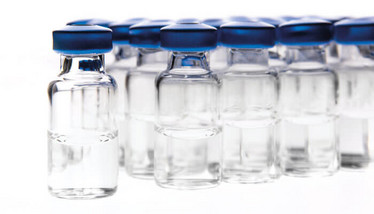
The Innovators
Meet two companies helping to advance pharmaceutical development and manufacture.
SPONSORED FEATURE

Accelerate Effective Cell Therapies By Identifying T Cells That Matter
Directly link phenotype and function to gene expression
T cell-based therapies are showing great promise, but have also been associated with significant side effects. Improving efficacy and reducing toxicity has proven challenging because T cell-mediated tumor death relies on complicated cell-cell interactions that traditional analytical tools have not allowed us to fully understand. The complexity of these drugs has driven the adoption of single-cell methods, but these advanced technologies still require us to draw correlative, rather than causative, conclusions based on data collected on different T cell populations.
Berkeley Lights’ award-winning Lightning™ optofluidic platform and T Cell Analysis Suite change this by truly enabling longitudinal studies of individual T cells and cell-cell interactions. Single T cells can be selectively placed into thousands of nanoliter-sized chambers on a microfluidic chip based on cell surface phenotype and co-cultured with target cells. Time-lapse imaging is then used to directly assess T cell function (cytokine secretion) and killing (target cell death); then, individual T cells of interest can be exported alive for downstream analysis such as TCR sequencing or RNA-Seq.
This enables recovery of TCR sequences that are directly associated with desired killing behavior, characterization of differences in antigen-specific killing kinetics, and discrimination between multiplexed and serial killing. Importantly, these experiments are performed on thousands of individual T cells in parallel in a single day and on a single platform, enabling fast, actionable, causative conclusions. Such rapid, deep characterization has the potential to not only provide novel insights, but also to accelerate the development of more efficacious cell therapies.
Visit berkeleylights.com/CellAnalysisSuite to see TCR and CAR-T use cases.

Unshackling Pharmaceutical Manufacturing With Next-Generation Glass Packaging
The future of glass packaging is here
Glass is the gold standard material for parenteral packaging applications given its chemical durability, optical clarity, and thermal and mechanical performance. However, conventional glass packaging is not without limitations. All glass containers possess surface flaws that may substantially reduce strength and increase the likelihood of breakage on the filling line. The number and severity of these flaws increase as packaging is transported along the line, particularly from damage created by glass-to-glass and glass-to-metal contact. The performance of fill-finish operations is continually affected by these limitations in direct ways that reduce efficiency and throughput. There are also indirect consequences – the quality of product-filled containers leaving a facility can be compromised by glass particle contamination or cracks that compromise sterility if they are not detected by routine inspection processes. The pharmaceutical industry has come to accept these limitations as a standard cost of doing business, but innovations in glass are enabling a step change improvement in performance that shatters these old assumptions.
Corning Valor® Glass is a revolutionary pharmaceutical packaging technology that helps protect patients and improve pharmaceutical manufacturing. Valor® Glass is a boron-free, aluminosilicate composition that will not exhibit glass delamination. The composition is also optimized for chemical strengthening by an ion exchange process, resulting in a container that is approximately 10 times stronger than conventional borosilicate glass packaging and capable of withstanding many of the mechanical stresses encountered in fill-finish operations (e.g., glass-to-glass impacts, transitions in container flow, etc.). The exterior surface of Valor® Glass containers is strengthened with a low coefficient of friction (COF) coating. The coating acts as a barrier against damage that would typically be experienced by conventional borosilicate containers, thereby preserving strength and reducing the incidence of cosmetic glass defects. As a result of this damage resistance, Valor® Glass reduces the generation of particles on the line by at least 96 percent improving product quality and helping to protect patient safety. The machinability of Valor® Glass containers is also exceptional – the low COF coating enables glass containers to flow smoothly on the line with fewer micro-stops and jams.
Corning is working closely with customers to demonstrate the value of Valor® technology in pharmaceutical manufacturing. More than 50 line trials have been conducted to date, and the results are clear. Valor® Glass provides substantial improvements across multiple performance metrics when compared to conventional borosilicate glass packaging. Effective line speeds are routinely increased by >20 percent by reducing glass-related downtime events such as vial breakage that requires operator interventions. Overall yields are also increased because of fewer cosmetic and particle rejects while providing a 30-fold reduction in the possibility of forming stable cracks that can compromise sterility. The takeaway message is that Valor® Glass gives pharmaceutical companies and contract manufacturing partners the ability to produce higher quality drugs at a faster rate, thereby improving throughput, increasing incremental unit sales, and delaying decisions to expand their capital-intensive manufacturing footprint.
Valor® Glass technology is a drop-in solution. As with the adoption of any glass package from a new supplier, minor equipment adjustments may be necessary when transferring to Valor® technology, but these adjustments are within normal process windows. The performance of Valor® Glass can be realized with standard equipment and processes, including washing, depyrogenation, sterilization, and lyophilization. Finally, Valor® Glass has the potential to significantly reduce the constraints placed on today’s filling lines by conventional borosilicate glass packaging.
The superior mechanical performance of Valor® Glass has been demonstrated by lines operating in excess of 600 vials per minute. The additional operational efficiencies provided by these speeds would dramatically change the economics of manufacturing. “Our customers are excited about the benefits offered by Valor® Glass. The potential of running their manufacturing lines at 600+ vpm is a true game changer, and Valor® Glass is the key to unlocking that potential,” said Matthew Hall, manager of the applications engineering group for Corning Pharmaceutical Technologies.
Corning recently announced that a leading pharmaceutical manufacturer has received FDA approval to use Valor® Glass as a primary package for a marketed drug product. This marks the first time that the FDA has approved a new glass composition specifically designed for pharmaceutical packaging since the development of borosilicate glasses more than 100 years ago.
Visit www.corning.com/valor for more information.



















